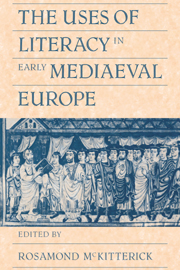Book contents
- Frontmatter
- Contents
- List of illustrations
- Contributors
- Preface
- Abbreviations
- Introduction
- 1 Literacy in Ireland: the evidence of the Patrick dossier in the Book of Armagh
- 2 Anglo-Saxon lay society and the written word
- 3 Administration, law and culture in Merovingian Gaul
- 4 Literacy and the papal government in late antiquity and the early middle ages
- 5 Literacy and the laity in early mediaeval Spain
- 6 Aspects of mediaeval Jewish literacy
- 7 Writing in early mediaeval Byzantium
- 8 Literacy displayed: the use of inscriptions at the monastery of San Vincenzo al Volturno in the early ninth century
- 9 Royal government and the written word in late Anglo-Saxon England
- 10 Literacy in Carolingian government
- 11 Text and image in the Carolingian world
- Conclusion
- Index
Introduction
Published online by Cambridge University Press: 07 December 2009
- Frontmatter
- Contents
- List of illustrations
- Contributors
- Preface
- Abbreviations
- Introduction
- 1 Literacy in Ireland: the evidence of the Patrick dossier in the Book of Armagh
- 2 Anglo-Saxon lay society and the written word
- 3 Administration, law and culture in Merovingian Gaul
- 4 Literacy and the papal government in late antiquity and the early middle ages
- 5 Literacy and the laity in early mediaeval Spain
- 6 Aspects of mediaeval Jewish literacy
- 7 Writing in early mediaeval Byzantium
- 8 Literacy displayed: the use of inscriptions at the monastery of San Vincenzo al Volturno in the early ninth century
- 9 Royal government and the written word in late Anglo-Saxon England
- 10 Literacy in Carolingian government
- 11 Text and image in the Carolingian world
- Conclusion
- Index
Summary
This book aims to investigate the respects in which literacy and orality were important in early mediaeval Europe. It examines the context of literacy, its uses, levels, and distribution, in a number of the societies of early mediaeval Europe, that is, the area from Ireland to Byzantium and the eastern Mediterranean between c. 400 and c. 1000. None of the contributors has attempted a comprehensive survey, nor is it intended that any chapter should be regarded as an attempt to be definitive. Rather, we hope to open up a topic in relation to the early middle ages that has already been treated extensively for earlier and later periods and in modern societies. We aim to indicate some of the areas for debate and argument and make new research available to scholars and students.
In many ways the book represents, therefore, an introduction to the subject of literacy in the early middle ages. Its basic premise is that literacy is a subject with which early mediaevalists should be concerned. Our studies set out to provide the factual basis from which assessments of the significance of literacy in the early mediaeval world can be made, and to offer some suggestions about what that significance might be. In other words, the significance of literacy and why it is important to observe its uses and implications in the early middle ages have to be established on the basis of the evidence available; they cannot be assumed before we start.
- Type
- Chapter
- Information
- The Uses of Literacy in Early Mediaeval Europe , pp. 1 - 10Publisher: Cambridge University PressPrint publication year: 1990
- 1
- Cited by



